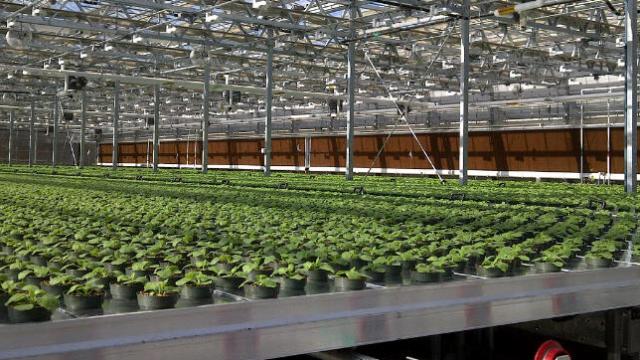Finally, some good news about tobacco and your health. No, there is no nicotine involved, but there will be lots and lots of virus-like particles. Tobacco plants could be one of the fastest and most effective ways of making the seasonal flu vaccine — much faster than the current method using chicken eggs.
The flu shot you get every winter is made from a soup of viruses grown in the nutrient-rich environment of an egg. One egg makes about one dose, which means every year 100 million chicken eggs are broken for the sake of our throats and noses. The viruses are then extracted, purified and broken up into protein particles that provoke an immune response without making you sick.
This slow and rather cumbersome method is completely reliant on the availability of eggs, and the whole process takes about six months, meaning it has to start well before flu season itself is underway. If a new strain emerges, then you’re out of luck.
A couple years ago, DARPA decided to try a novel approach to improving the vaccine supply chain. Instead of growing whole viruses inside eggs, virus-like protein particles are grown in tobacco plants. That research has matured with the biotech company Medicago, which is jointly owned by Philip Morris and Mitsubishi. Their warehouse in North Carolina grows Nicotiana Benthanea, a close relative of the tobacco plant we smoke and chew much to the detriment of our health.
This tobacco process takes only six weeks to make vaccines, as Jesse Hirsch explains in a piece for Modern Farmer:
At the Medicago greenhouse, millions of these plants are grown for five weeks, uncontaminated. Technicians then suck the air out of each plant with a vacuum before submerging them in VLP-laden water. “Think of it like a sponge,” says Dave Henry, Medicago’s manufacturing director. “You start by squeezing it out. Then when it goes underwater it will suck in everything around it. It’s the same with the plant’s leaves.”
Once inside the plant, the VLPs spend a week growing. Initially the leaves get translucent but after a few days they grow mottled and discolored. According to Henry, they have essentially caught the flu. At the end of a week, the leaves are picked off each plant by hand for conversion into a useable vaccine.
And in case you’re wondering, there is no nicotine in the final vaccine. Medicago’s avian flu vaccine has been effective in mice, and Phase I trials have found it so far to be safe in humans. The company also has its eyes set on other viral vaccines, such as that for rotavirus.
Assuming it all works, it will still be years before tobacco vaccines make it pass FDA regulations and into the doctor’s office. But someday, perhaps, tobacco won’t just be responsible for ruining our health. [Modern Farmer]
Picture: Medicago
